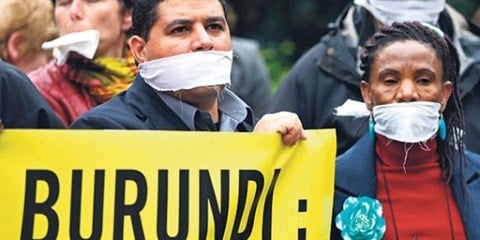Access urges action on Burundi's internet shut down
In a letter written to UN and AU, Access underscores the importance of the internet to realising human rights, and explains how shutdowns often enable shocking human rights violations.

This comes after the Burundian Government ordered the shutdown of social media applications including Twitter, Facebook, WhatsApp, and Viber on the mobile Web beginning on April 27, 2015. The country's telecom sector regulator ordered telecom operators to block the apps, according to reports.
"Although fixed-line internet does not appear to be impacted, the majority of internet users in Burundi rely upon mobile internet for connectivity," Access noted in a letter to the UN and the African Union.
A radio station in Burundi has also been reported closed while others are prevented from broadcasting live the protests, which have so far killed several people and more than 10,000 people have fled to neighbouring countries.
"We are writing to urgently request your immediate action on the internet shutdown taking place in Burundi, and your sustained attention to the increasing trend of blocking, throttling, and disconnecting users' digital communications during times of protest," Access said in its letter.
Blocking of the Internet or applications on the Internet such as social media, violates the right to freedom of expression by denying the rights of persons to seek, receive and impart information, Access said
In January this year, the Democratic Republic of Congo (DRC) also blocked access to the Internet, social media and mobile phone communications following days of protests aimed at blocking President Joseph Kabila from seeking a third term of office. In Niger, the government had also ordered telcos to shut down services. The providers complied from January 22 through January 24, 2015.
As in many other countries in Africa, including Malawi, Zimbabwe and Zambia, the Burundian government claims the Internet is putting the security of the country at risk because protesters are using it to coordinate protests.
"We further request that your Excellencies investigate shutdowns, in their various forms, in order to produce a public report that examines this alarming trend and its impact on human rights, and makes recommendation to governments and companies on how to prevent future disruptions," concluded the letter.
The protests in Burundi are aimed at stopping President Pierre Nkurunziza's third-term bid. The country's constitution allows a president to rule for a five-year term, renewable for one term. However, Nkurunziza and his supporters claim he is eligible to serve a third term because he was first installed as president to lead a transitional government, rather than by a popular vote.
Source: allAfrica

AllAfrica is a voice of, by and about Africa - aggregating, producing and distributing 2000 news and information items daily from over 130 African news organisations and our own reporters to an African and global public. We operate from Cape Town, Dakar, Lagos, Monrovia, Nairobi and Washington DC.
Go to: http://allafrica.com/




